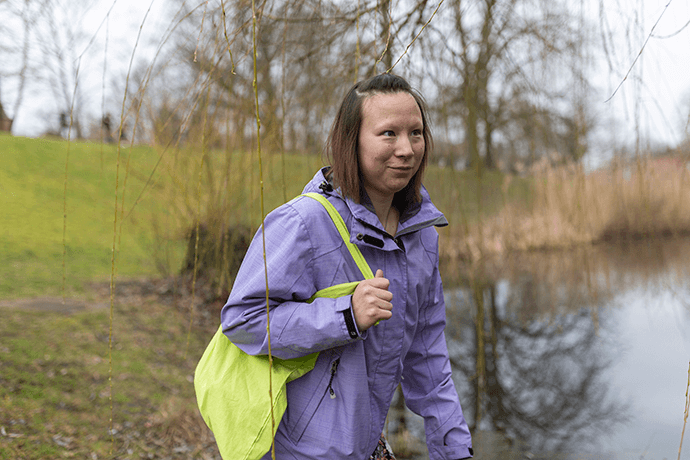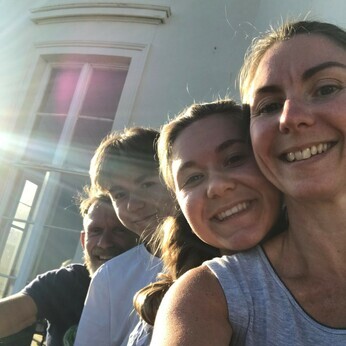Partnering for Progress: The Importance of Collaboration in Primary Biliary Cholangitis (PBC) Awareness
Sandra Silvestri, Executive Vice President & Chief Medical Officer at Ipsen, reflects on the theme for this year’s PBC Awareness Day, what living with PBC really means, and the power of collaborating with patient organizations to help drive progress in PBC care.
September is a month dedicated to raising awareness about Primary Biliary Cholangitis, I find myself reflecting on the challenges faced by those living with rare cholestatic disease. PBC Awareness Day on September 8th is not just a date on the calendar; it’s a reminder that understanding and supporting individuals living with PBC can help them navigate life with this challenging condition.
Over the years, I’ve had the privilege of listening to the experiences of people living with PBC, and each story is a testament to their incredible resilience and strength. The daily challenges they face are often unimaginable, such as the overwhelming fatigue and the itching that disrupts sleep and impacts their quality of life. Yet, despite these hardships, the PBC community continues to educate and advocate for better understanding and treatment of their condition. Their courage inspires us at Ipsen and reinforces the importance of the work we do.
The Importance of PBC Awareness
On this PBC Awareness Day, it’s more important than ever to bring attention to rare liver disease. Robert Mitchell-Thain, CEO of the PBC Foundation, describes PBC Awareness Day as “an opportunity for the entire community to talk about PBC, to share stories, to raise awareness, and to make sure that the wider public has an idea of what it is.” This year’s theme is centred around Providing Better Care. We are honoured to support the PBC Foundation in their mission, recognizing PBC Awareness Month throughout September.
PBC is a rare, progressive, autoimmune cholestatic liver disease that predominantly affects women aged 40-60 years of age.1 The condition is characterized by chronic inflammation of the bile ducts in the liver, which can eventually lead to severe scarring, known as cirrhosis, and, in severe cases, liver failure. One of the main symptoms of PBC is extreme, ongoing fatigue affecting 95% of patients. Another is debilitating itching, affecting 70% of patients, which can impact sleep and exacerbate fatigue further. 2,3 Despite how common these symptoms are, PBC still often remains misunderstood. For example, it’s sometimes incorrectly associated with alcohol-related liver disease. This confusion can lead to judgement and isolation, making it even more challenging for those living with PBC to navigate their daily lives.
That’s why it is vital that those living with PBC feel empowered to educate others about their condition, helping to stamp out misconceptions and build a more supportive community around them. Awareness is not just about understanding the disease, it’s also about the wider community expressing empathy, breaking down stigmas, and creating an environment where those affected feel supported and understood.
The Power of Patient Organizations and Collaborative Efforts
For those living with PBC, every day presents challenges, and we must use the month of September to not only raise awareness but also educate others about what living with PBC truly means. Patient organizations play a fundamental role in this mission, offering more than just information – they provide a lifeline, a sense of community, and a bridge between patients and healthcare providers.
Robert Mitchell-Thain shared his story on how he got involved with PBC after his mother was diagnosed with the condition 30 years ago. At this time, she was given five years to live, yet thirty years later, she’s still alive and well: “I got involved because I saw her story and I wanted to really try and fight as best I could to make sure that as many patients as possible with PBC have access to the information and the support when, how, and where they need it”. The PBC Foundation has made a significant impact on the PBC community by offering resources, raising awareness, and advocating for better care and treatment options.
Collaboration is key to driving progress in PBC care. At Ipsen, we believe in the power of working together with patient organizations, clinicians, researchers, and industry partners. This collaborative approach allows us to gather data, share knowledge, and develop treatments that truly address the needs of patients. We work closely with the PBC Foundation and other partners to ensure that our efforts are aligned with the needs of the PBC community. As Robert Mitchell-Thain states, “We work really hard with patients, clinicians, academics, and industry partners to bring together all the knowledge that is out there about PBC.” This kind of partnership is what drives meaningful change. By pooling our resources and expertise, we can ensure that our efforts are focused on improving the lives of those living with PBC.
Our commitment to improving the lives of people living with PBC
As we reflect on the significance of PBC Awareness Day and Month, it is clear that collaboration and support are key to making a difference in the lives of those living with PBC. We must continue to raise awareness, support patient organizations, and drive innovation in PBC care. At Ipsen, we are immensely grateful to the PBC community for continuing to share their stories with us and we will continue to listen to what they have to say – not just throughout PBC Awareness Month, but every single day.
Together, I believe we can create a brighter future for everyone living with PBC. The journey ahead may be challenging, but with the support of the PBC community, patient organizations, and committed partners, I am confident that we can make a real difference in the lives of those affected by this disease.
For more information about this year’s PBC Awareness Day theme, Provide Better Care, visit www.ipsen.com/rare-diseases/provide-better-care-pbc-awareness-day-2024/ and www.pbcfoundation.org.uk/what-is-pbc/
References
- Galoosian A, et al. 2020. Clinical updates in primary biliary cholangitis: trends, epidemiology, diagnostics, and new therapeutic approaches. J Clin Transl Hepatol. 8(1), pp. 49-60.
- Mells GF, et al. 2013. Impact of Primary Biliary Cholangitis on Perceived Quality of Life: The UK-PBC National Study. Hepatol. 58: 273-283.
- C Levy, et al. 2023. Understanding the Experience of Patients with Primary Biliary Cholangitis and Pruritus. Abstract presented at ISPOR, 7-11 May 2023, Boston.









